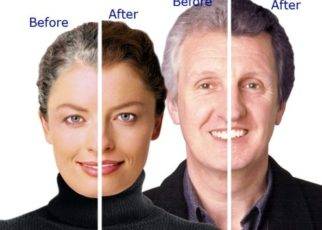Symptoms of Alopecia Areata (bald spots)
People who experience alopecia areata may notice small round patches of bare skin in areas where hair used to be. These patches are quarter-sized in most cases but can progress to complete loss of hair on the head (alopecia areata totalis) or loss of all body hair (alopecia areata universalis).
According to an April 2009 article on the National Institute of Arthritis and Musculoskeletal and Skin Diseases web site entitled “Alopecia Areata,” hair loss due to alopecia areata tends to be unpredictable:
Sometimes the hair grows back without future episodes.
Others have re-growth of hair only to have hair loss again once or multiple times.
Some people never experience a re-growth of hair, resulting in permanent hair loss.
Hair that grows back may be the same color as the original hair or the new hair may appear white initially with a gradual return to the original color and texture.
Why Would Diet Affect Hair Loss?
According to a May 1998 study by Not T et. al. entitled “Celiac disease risk in the USA: high prevalence of antiendomysium antibodies in healthy blood donors,” celiac disease may affect one out of 250 people. Diagnosis rates in America for gluten-sensitive enteropathy, or celiac disease, is much lower than these numbers would indicate, so many people in the United States may have undiagnosed gluten sensitivity.
According to a December 15, 2002 article by David A. Nelsen, Jr. M.D., M.S. entitled “Gluten-Sensitive Enteropathy (Celiac Disease): More Common Than You Think,” alopecia areata is a possible symptom of celiac disease due to a possible immunological attack on hair follicles. Some people can have celiac disease without any known symptoms. According to the above December 2002 study, others may have one or more symptoms, including, but not limited to:
fatigue and/or weight loss
abdominal pain, cramps, and/or gas
anemia
bone pain
mouth sores
low blood sugar
infertility
male impotence
seizures
Hair Loss May be Reversed with Gluten-free Diet
People with celiac disease are sensitive to gluten and related proteins, including:
wheat
rye
barley
foods contaminated with the above in the field or in production
Most breads, pastas, cereals, crackers, and many other foods contain ingredients with gluten or may be cross-contaminated with gluten; however, more gluten-free choices are available today than were available in the past.
A completely gluten-free diet may result in intestinal healing as well as an improvement in other symptoms, such as hair loss, associated with the food sensitivity. Maintaining a gluten-free diet may result in long-term relief of symptoms.
Gluten-free Diet May Treat the Reason for Hair Loss
Most treatments for hair loss are limited. They may temporarily produce re-growth of hair, but the underlying cause of hair loss may remain untreated. Approximately one out of 250 people may have celiac disease and multiple symptoms related to a gluten sensitivity. If hair loss is due to an autoimmune response related to celiac disease, the potential of new hair growth is possible if a completely gluten-free diet is started.





